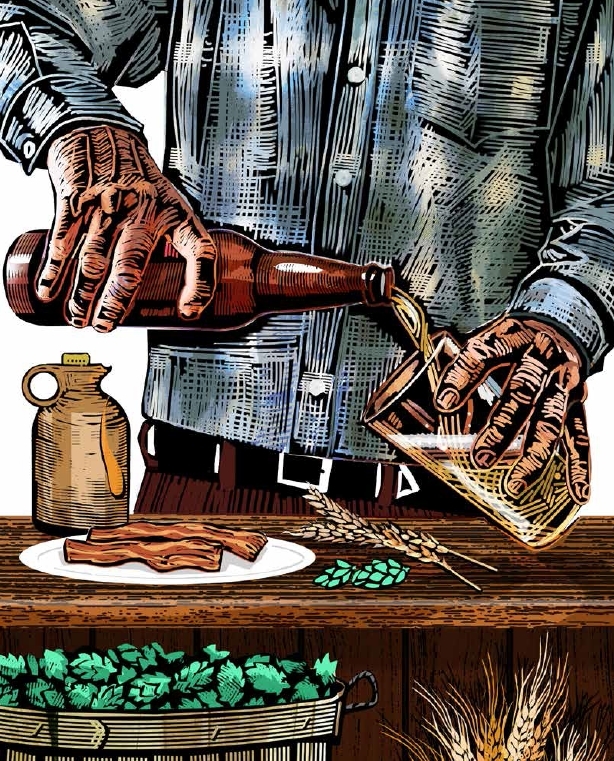
By J. Cameron Verhaal, assistant professor of management, A. B. Freeman School of Business
Rogue Ales is a highly successful craft brewery located in Newport, a small town on the Oregon coast. Founded in 1988, the company entered the market well ahead of the craft beer segment’s meteoric rise within the broader U.S. beer industry. Since then, Rogue has grown into one of the largest and most recognizable craft breweries in the United States. Many would assume that it was their wildly popular signature beer, Dead Guy Ale, that fueled their growth. Indeed, conventional wisdom and basic business strategy suggests that course of action: Focus your resources on key capabilities (and your most popular products) in order to grow through the efficiencies captured by economies of scale in the production process.
At some point along the way, however, Rogue veered from this course. Instead of focusing on its most popular products, the brewery has produced over 300 different beers boasting a dizzying array of ingredients, flavors and styles. While creativity and experimentation in the brewing process is a hallmark of the craft beer industry, Rogue has taken it to the extreme. Voodoo Doughnut Bacon Maple Ale, for example, is a smoked beer brewed with bacon and maple syrup. According to the beer ratings website Beer Advocate, Voodoo Doughnut Bacon Maple
Ale has been rated nearly 1,700 times since it debuted eight years ago and ranks in the bottom 2% of the nearly 300 Rogue beers that have been reviewed on the site. OK, lesson learned. Go back to focusing on your most popular beers, like Dead Guy Ale, and all will be well. Instead, however, Rogue has continued to produce Bacon Maple Ale as well as a variety of new beers in the same vein — chocolate, peanut butter and banana beer; marshmallows and lemon chiffon beer; grape soda beer; and even a Sriracha hot sauce beer. All of them have been similarly savaged by reviewers.
Why would Rogue continue to pour scarce and valuable resources into producing beers that consumers generally dislike? Although it’s one of the larger craft breweries, Rogue still faces an increasingly saturated and competitive U.S. market. Moreover, even if these beers sold well due to their novelty — perhaps as gag gifts — what are the long-term implications for Rogue’s brand if it becomes better known for novelty beers than its highest quality offerings?
I would argue that it is precisely these types of actions that reinforce Rogue’s standing as a true and authentic craft brewery. This logic is rooted in the research of Erving Goffman, the renowned sociologist and social psychologist, in his book The Presentation of the Everyday Self. Goffman uses the analogy of a theater stage and distinguishes between an individual’s “frontstage” and “backstage” personas. The frontstage is the public view that one
outwardly projects for all to see while the backstage is the true identity that hides behind the curtain and is not visible to the public eye. Authenticity is achieved when an individual’s — or a brewery’s — frontstage mirrors its backstage. In other words, are you really who you claim to be?
Recent research builds on Goffman’s idea, examining authenticity in a number of different contexts. Oliver Hahl distinguishes between the notion of valuing intrinsic rewards over extrinsic rewards as a key driver of authenticity. Similarly, Glenn Carroll introduces the idea of moral authenticity, which suggests that authentic firms are able to convince consumers that their true motivation is for “the love of it” rather than monetary success.
In a recent paper I co-wrote with Hahl, we merge these ideas to examine authenticity in the context of Cuban cigars. The transfer of power in Cuba from Fidel Castro to Raul Castro (who espoused a more free-market mentality) and the subsequent warming of diplomatic relations between the U.S. and Cuba has led to a decrease in the appeal and perceived authenticity of Cuban cigars (controlling for underlying quality). We argue that one reason for this decrease is that consumers began to question the moral authenticity of Cuban cigars now that they’re no longer ‘forbidden fruit’ and indelibly connected to Cuba’s revolutionary and anti-free market heritage.
In the case of Rogue, continuing to produce eclectic beers regardless of consumer interest functions as a way of signaling its moral authenticity — its commitment to something other than money — in the face of growth. As the owner of Rouge stated in a recent interview, “We never intended to get big…growth for us is a byproduct of doing things that are consistent with our brand.”
So while it may be inefficient to produce beers like Bacon Maple Ale and Sriracha Hot Stout, they serve a valuable function: helping to convince customers that, regardless of how big it grows, Rogue is still in business for the love of beer.
